| ◄ APRIL ► | ||||||
|---|---|---|---|---|---|---|
| ◄ 1950 ► | ||||||
| 1 | ||||||
| 2 | 3 | 4 | 5 | 6 | 7 | 8 |
| 9 | 10 | 11 | 12 | 13 | 14 | 15 |
| 16 | 17 | 18 | 19 | 20 | 21 | 22 |
| 23 | 24 | 25 | 26 | 27 | 28 | 29 |
| 30 | ||||||
| President: | Harry S Truman (D) | |||
| Vice-President: | Alben W. Barkley (D) | |||
| House: | 262 (D) | 168 (R) | 2 (Other) | 3 (Vacant) |
| Southern states: | 102 (D) | 2 (R) | 1 (Vacant) | |
| Senate: | 54 (D) | 42 (R) | ||
| Southern states: | 22 (D) | |||
| GDP growth: | 10.3% | (Annual) | ||
| 3.9% | (Quarterly) | |||
| Inflation: | -1.3% | |||
| Unemployment: | 5.8% | |||
▲Saturday, April 1
![]()
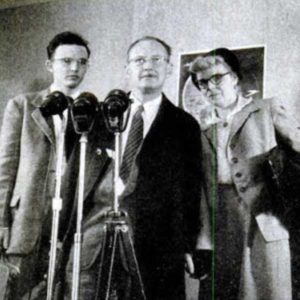 Apr 1: Lattimore returns to the U.S., calls McCarthy a “hit-and-run politician.” Owen Lattimore, a Johns Hopkins University expert on the Far East, returns to New York from Afghanistan were he was heading a U.N. mission on economic assistance and development. With his wife and son by his side, Lattimore angrily denies Sen. McCarthy’s (R-WI) charges that Lattimore was working with Communists “to destroy the nation by force of violence.” McCarthy had also privately charged that Lattimore was “the top Russian espionage agent in this country.” Lattimore calls McCarthy a “base and miserable creature” and a “hit-and-run politician.” Lattimore says that McCarthy’s “obviously political” attacks against the State Department were seriously damaging to America’s position abroad and helping the Soviets in ways that “exceed their wildest dreams.”
Apr 1: Lattimore returns to the U.S., calls McCarthy a “hit-and-run politician.” Owen Lattimore, a Johns Hopkins University expert on the Far East, returns to New York from Afghanistan were he was heading a U.N. mission on economic assistance and development. With his wife and son by his side, Lattimore angrily denies Sen. McCarthy’s (R-WI) charges that Lattimore was working with Communists “to destroy the nation by force of violence.” McCarthy had also privately charged that Lattimore was “the top Russian espionage agent in this country.” Lattimore calls McCarthy a “base and miserable creature” and a “hit-and-run politician.” Lattimore says that McCarthy’s “obviously political” attacks against the State Department were seriously damaging to America’s position abroad and helping the Soviets in ways that “exceed their wildest dreams.”
▲Sunday, April 2
Palm Sunday, First Day of Passover
![]() Apr 2: Coal faces competition form natural gas and fuel oil. Coal operators say that almost 3,000 miners in Pennsylvania have lost their jobs due to the closing of high-cost mines in the four weeks since the industry signed a new labor agreement with the United Mine Workers. Operators blame higher labor costs and competition from fuel oil, which provides a more convenient method of home heating that doesn’t require dirty coal storage bins or shoveling fuel into furnaces. Salesmen for oil-burning heating equipment have been especially busy in recent weeks. Large industrial consumers find that they can cut their bills by one-seventh by burning oil instead of coal. Coal operators find that, despite the backlog of orders created by the lengthy coal strike, they are unable to raise prices.
Apr 2: Coal faces competition form natural gas and fuel oil. Coal operators say that almost 3,000 miners in Pennsylvania have lost their jobs due to the closing of high-cost mines in the four weeks since the industry signed a new labor agreement with the United Mine Workers. Operators blame higher labor costs and competition from fuel oil, which provides a more convenient method of home heating that doesn’t require dirty coal storage bins or shoveling fuel into furnaces. Salesmen for oil-burning heating equipment have been especially busy in recent weeks. Large industrial consumers find that they can cut their bills by one-seventh by burning oil instead of coal. Coal operators find that, despite the backlog of orders created by the lengthy coal strike, they are unable to raise prices.
▲Monday, April 3
▲Tuesday, April 4
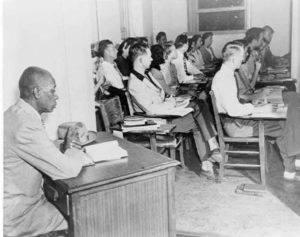 Apr 4: Supreme Court hears two cases challenging segregation in public universities. The U.S. Supreme Court concludes its second and final day of oral arguments in two cases challenging segregated facilities for African-Americans. Yesterday, the court heard a challenge, backed by Attorney General J. Howard McGrath and Solicitor General Philip B. Perlman, seeking to overturn an Interstate Commerce Commission regulation allowing the Southern Railway to maintain segregated dining cars. Today, the Court resumes oral arguments for two cases involving Negro students attending state universities. In the first case, George W. McLaurin, a grad student at the University of Oklahoma, is fighting regulations that force him to listen to lectures through an open door in an adjoining room and to use segregated facilities in the library and cafeteria. McLaurin’s attorney protests that “The only purpose for this segregation is to symbolize his alleged inferiority to white students. Oklahoma makes him ‘an American untouchable’.” Oklahoma Assistant Attorney General counters, “The Court knows these laws on separate education are not based on a desire to humiliate anybody. They are based on the fact that racial friction has arisen — trouble has arisen in the past.” In the second case, Herman Sweatt seeks admission to the University of Texas law school, which bars black students. He has refused to register at another law school that the state hastily established for Negroes shortly after he applied at U.T. Texas Attorney General Price Daniels tells the Court, “It’s reality that we have to face — some people have the feeling that conflict results when the races get too close.” Sweatt’s attorney, Thurgood Marshall of the NAACP, fires back: “It’s just beyond reason that if one Negro is admitted to the law school of the University of Texas that the whole state will end up in bloodshed.” The Court will deliver its decisions in all three cases in June.
Apr 4: Supreme Court hears two cases challenging segregation in public universities. The U.S. Supreme Court concludes its second and final day of oral arguments in two cases challenging segregated facilities for African-Americans. Yesterday, the court heard a challenge, backed by Attorney General J. Howard McGrath and Solicitor General Philip B. Perlman, seeking to overturn an Interstate Commerce Commission regulation allowing the Southern Railway to maintain segregated dining cars. Today, the Court resumes oral arguments for two cases involving Negro students attending state universities. In the first case, George W. McLaurin, a grad student at the University of Oklahoma, is fighting regulations that force him to listen to lectures through an open door in an adjoining room and to use segregated facilities in the library and cafeteria. McLaurin’s attorney protests that “The only purpose for this segregation is to symbolize his alleged inferiority to white students. Oklahoma makes him ‘an American untouchable’.” Oklahoma Assistant Attorney General counters, “The Court knows these laws on separate education are not based on a desire to humiliate anybody. They are based on the fact that racial friction has arisen — trouble has arisen in the past.” In the second case, Herman Sweatt seeks admission to the University of Texas law school, which bars black students. He has refused to register at another law school that the state hastily established for Negroes shortly after he applied at U.T. Texas Attorney General Price Daniels tells the Court, “It’s reality that we have to face — some people have the feeling that conflict results when the races get too close.” Sweatt’s attorney, Thurgood Marshall of the NAACP, fires back: “It’s just beyond reason that if one Negro is admitted to the law school of the University of Texas that the whole state will end up in bloodshed.” The Court will deliver its decisions in all three cases in June.![]()
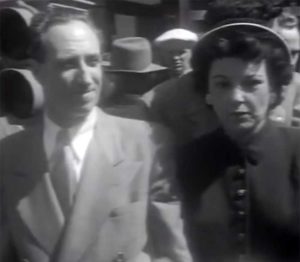 Apr 4: Labor leader Harry Bridges convicted of perjury for denying Communist links. A San Francisco Federal Court jury finds Australian-born Harry Bridges, head of the International Longshoremen’s and Warehousemen’s Union, guilty of perjury for denying that he had been a member of the Communist Party when he applied for U.S. citizenship in 1945. The trial is the latest chapter in a long-running effort to deport Bridges that stretches back more than a decade. In 1934, Bridges emerged as an influential labor leader during a bloody longshoremen strike in San Francisco that saw strikebreakers in trucks ramming picket lines and San Francisco police shooting up a union mess hall. Three years later, Bridges organized the ILWU by encouraging union locals to leave the business-friendly International Longshoreman’s Association, which was affiliated with the American Federation of Labor (AFL). Bridges aligned the ILWU with the more industry-focused Congress of Industrial Organizations (CIO), which companies saw as a greater threat than that posed by the more craft-focused AFL. Ever since then, the U.S. government has been trying to deport Bridges back to Australia. Bridges had survived two earlier deportation efforts as a resident alien in 1939 and 1941. In 1945, the U.S. Supreme Court halted the effort launched in 1941, calling the evidence that Bridges was a Communist “exceedingly tenuous.” Bridges became a citizen three months later, making the task of getting rid of him much more difficult. But with today’s verdict, the way is clear to strip him of his citizenship and deport him as a felon. In addition to the perjury conviction, Bridges is also found guilty of obtaining citizenship by fraud. Two co-defendants, who served as his character witnesses when he was naturalized, are also convicted of conspiring to help him win citizenship by fraud and for committing perjury in the process. The verdicts come on the eighty-fifth court day of a trial that began on November 14, and which produced plenty of fireworks between the defense team and the prosecution. Chief defense attorney Vincent Hallinan was twice found in contempt of court. He will serve a six-month sentence when the trial is over. Associate defense counsel James MacInnis will serve a three-month sentence for contempt. Bridges will be sentenced on Monday.
Apr 4: Labor leader Harry Bridges convicted of perjury for denying Communist links. A San Francisco Federal Court jury finds Australian-born Harry Bridges, head of the International Longshoremen’s and Warehousemen’s Union, guilty of perjury for denying that he had been a member of the Communist Party when he applied for U.S. citizenship in 1945. The trial is the latest chapter in a long-running effort to deport Bridges that stretches back more than a decade. In 1934, Bridges emerged as an influential labor leader during a bloody longshoremen strike in San Francisco that saw strikebreakers in trucks ramming picket lines and San Francisco police shooting up a union mess hall. Three years later, Bridges organized the ILWU by encouraging union locals to leave the business-friendly International Longshoreman’s Association, which was affiliated with the American Federation of Labor (AFL). Bridges aligned the ILWU with the more industry-focused Congress of Industrial Organizations (CIO), which companies saw as a greater threat than that posed by the more craft-focused AFL. Ever since then, the U.S. government has been trying to deport Bridges back to Australia. Bridges had survived two earlier deportation efforts as a resident alien in 1939 and 1941. In 1945, the U.S. Supreme Court halted the effort launched in 1941, calling the evidence that Bridges was a Communist “exceedingly tenuous.” Bridges became a citizen three months later, making the task of getting rid of him much more difficult. But with today’s verdict, the way is clear to strip him of his citizenship and deport him as a felon. In addition to the perjury conviction, Bridges is also found guilty of obtaining citizenship by fraud. Two co-defendants, who served as his character witnesses when he was naturalized, are also convicted of conspiring to help him win citizenship by fraud and for committing perjury in the process. The verdicts come on the eighty-fifth court day of a trial that began on November 14, and which produced plenty of fireworks between the defense team and the prosecution. Chief defense attorney Vincent Hallinan was twice found in contempt of court. He will serve a six-month sentence when the trial is over. Associate defense counsel James MacInnis will serve a three-month sentence for contempt. Bridges will be sentenced on Monday.
▲Wednesday, April 5
 Apr 5: Cross is burned in Nashville. A huge fiery cross burns high above Nashville on historic Fort Negley Hill, just two miles south of downtown. The twelve-foot cross erected on the prominent hill is seen for several miles around, leading residents to swamp the police switchboard. Police are skeptical that the Ku Klux Klan is involved, despite this being the sixth cross burning in the county in the past year. Nashville leaders insist that there is no known Klan organization in the city. One policeman asserts, “The people who did it were just hoodlums with warped minds looking for a sensation at the expense of decent people.” Fort Negly, built by the Union Army during the Civil War, was the largest inland fort built during that conflict. Many Nashvillians see the cross-burning as a desecration of the Civil War landmark.
Apr 5: Cross is burned in Nashville. A huge fiery cross burns high above Nashville on historic Fort Negley Hill, just two miles south of downtown. The twelve-foot cross erected on the prominent hill is seen for several miles around, leading residents to swamp the police switchboard. Police are skeptical that the Ku Klux Klan is involved, despite this being the sixth cross burning in the county in the past year. Nashville leaders insist that there is no known Klan organization in the city. One policeman asserts, “The people who did it were just hoodlums with warped minds looking for a sensation at the expense of decent people.” Fort Negly, built by the Union Army during the Civil War, was the largest inland fort built during that conflict. Many Nashvillians see the cross-burning as a desecration of the Civil War landmark.▲Thursday, April 6
 Apr 6: Klansmen threaten businessman, state legislator. Five armed men barge into a building in downtown Jasper, Alabama, which houses the office of State Rep. Chester Black. Black has drawn the ire of the Ku Klux Klan for sponsoring legislation, enacted in 1949, which prohibits wearing a mask in public unless it is part of a Halloween or Mardi Gras celebration. The law was a direct response to a rash of lashings and other assaults by the Klan earlier that year. Rep. Black is out of town at the time, so the five armed men enter the jewelry store in the same building operated by Rev. Cecil Autry, who is also pastor of the Barnesville Baptist Church. “They told me,” says Autry, “I had been given three chances to join the Klan, but instead I called Klansmen a bunch of hoodlums and gangsters. They said they would get me for that. They warned me not to tell anyone, and told me that it wasn’t any use to notify officers because they were in on it too. They didn’t try to hide the fact they were Klansemn.” Seven or eight more men are seen loitering outside the shop during the confrontation. Jasper Police Commissioner E. Dick Burrow assures Autry that the police force is Klan-free and will provide full protection. The weekly Jasper Mountain Eagle reports that other political candidates in Walker County have been approached by the Klan and asked to state their positions. Black will retain his seat in the Statehouse in the May 2 Democratic primary, which essentially guarantees his re-election in November.
Apr 6: Klansmen threaten businessman, state legislator. Five armed men barge into a building in downtown Jasper, Alabama, which houses the office of State Rep. Chester Black. Black has drawn the ire of the Ku Klux Klan for sponsoring legislation, enacted in 1949, which prohibits wearing a mask in public unless it is part of a Halloween or Mardi Gras celebration. The law was a direct response to a rash of lashings and other assaults by the Klan earlier that year. Rep. Black is out of town at the time, so the five armed men enter the jewelry store in the same building operated by Rev. Cecil Autry, who is also pastor of the Barnesville Baptist Church. “They told me,” says Autry, “I had been given three chances to join the Klan, but instead I called Klansmen a bunch of hoodlums and gangsters. They said they would get me for that. They warned me not to tell anyone, and told me that it wasn’t any use to notify officers because they were in on it too. They didn’t try to hide the fact they were Klansemn.” Seven or eight more men are seen loitering outside the shop during the confrontation. Jasper Police Commissioner E. Dick Burrow assures Autry that the police force is Klan-free and will provide full protection. The weekly Jasper Mountain Eagle reports that other political candidates in Walker County have been approached by the Klan and asked to state their positions. Black will retain his seat in the Statehouse in the May 2 Democratic primary, which essentially guarantees his re-election in November.![]()
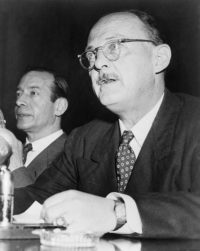 Apr 6: Lattimore answers McCarthy’s charges. Owen Lattimore, a Johns Hopkins professor, Far East expert and occasional adviser for the State Department, tells a Senate investigation subcommittee that he was not and never has been a Communist, a Communist sympathizer or agent. Lattimore testifies before Sen. Millard Tydings’s (D-MD) committee to answer charges made by Sen. Joseph McCarthy (R-WI) the previous month that Lattimore was “the top Soviet agent” in the State Department and “the architect” of the Far East policy that “betrayed” mainland China to the Communists. Lattimore countered that he had never met Secretary of State Dean Achison, that State Department policy ran almost exactly counter to his own recommendations, and that he was “the least consulted” of all of the Far Eastern experts. As for McCarthy’s charges, Lattimore declares: “He has violated (his office) by instituting a reign of terror among officials and employees in the United States government, no one of whom can be sure of safety from attack by the machine-gun or irresponsible publicity in Joseph McCarthy’s hands.”
Apr 6: Lattimore answers McCarthy’s charges. Owen Lattimore, a Johns Hopkins professor, Far East expert and occasional adviser for the State Department, tells a Senate investigation subcommittee that he was not and never has been a Communist, a Communist sympathizer or agent. Lattimore testifies before Sen. Millard Tydings’s (D-MD) committee to answer charges made by Sen. Joseph McCarthy (R-WI) the previous month that Lattimore was “the top Soviet agent” in the State Department and “the architect” of the Far East policy that “betrayed” mainland China to the Communists. Lattimore countered that he had never met Secretary of State Dean Achison, that State Department policy ran almost exactly counter to his own recommendations, and that he was “the least consulted” of all of the Far Eastern experts. As for McCarthy’s charges, Lattimore declares: “He has violated (his office) by instituting a reign of terror among officials and employees in the United States government, no one of whom can be sure of safety from attack by the machine-gun or irresponsible publicity in Joseph McCarthy’s hands.”
▲Friday, April 7
Good Friday
▲Saturday, April 8
![]()
 Apr 8: Navy aircraft shot down ove the Baltic. A Navy Consolidated PB4Y-2 Privateer, similar to the B-24 Liberator bomber, is shot down by Soviet fighter aircraft over the Baltic. The Soviets claimed that they had shot down a “Superfortress type” bomber that had flown over Latvia and opened fire on Soviet fighter planes. U.S. Navy officials say the unarmed plane was on a routine training flight from Weisbaden, West Germany to Copenhagen, and that it was on strict orders to stay away from Soviet territory. Unofficial sources in the U.S. say the plane was equipped with reconnaissance radar and aerial photographic equipment, and carried a crew of ten.
Apr 8: Navy aircraft shot down ove the Baltic. A Navy Consolidated PB4Y-2 Privateer, similar to the B-24 Liberator bomber, is shot down by Soviet fighter aircraft over the Baltic. The Soviets claimed that they had shot down a “Superfortress type” bomber that had flown over Latvia and opened fire on Soviet fighter planes. U.S. Navy officials say the unarmed plane was on a routine training flight from Weisbaden, West Germany to Copenhagen, and that it was on strict orders to stay away from Soviet territory. Unofficial sources in the U.S. say the plane was equipped with reconnaissance radar and aerial photographic equipment, and carried a crew of ten.
▲Sunday, April 9
Easter
Last Day of Passover
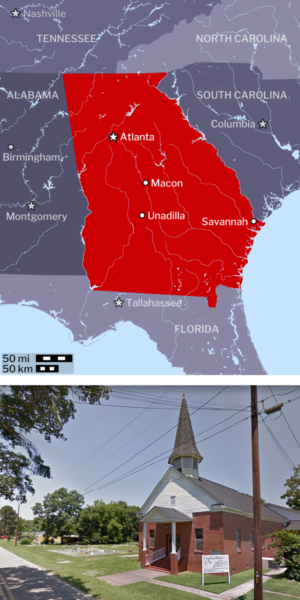 Apr 9: Black church forced to cancel Easter services. Camp Creek Baptist Church in Unadilla, Georgia, is forced to cancel its Easter services following anonymous telephone threats. This year’s service at the small African-American church would have been specially important, as it was to be held in honor of its 87-year-old pastor, Rev. George Taylor, who is celebrating his thirty-sixth anniversary with the church. Two white ministers, Rev. M.W. Flanders of Unadilla Methodist Church and Rev. L.F. Smith of Unadilla Baptist Church had accepted invitations to speak. But when Flanders began receiving anonymous telephone threats, word spread through town and Camp Creek decided to cancel their service because the “programs weren’t printed in time.” An unidentified member of the congregation concedes, “You know we get scared when something like this happens.” Flanders tells the congregation that if they wanted to hold the service for their paster later, he would be back and so would Rev. Smith. Flanders adds that he’ll bring along his Board of Stewards and Smith will bring his Board of Deacons. “The best people in this town are really wrought up about this thing,” says Flanders, “and the best people are on our side.”
Apr 9: Black church forced to cancel Easter services. Camp Creek Baptist Church in Unadilla, Georgia, is forced to cancel its Easter services following anonymous telephone threats. This year’s service at the small African-American church would have been specially important, as it was to be held in honor of its 87-year-old pastor, Rev. George Taylor, who is celebrating his thirty-sixth anniversary with the church. Two white ministers, Rev. M.W. Flanders of Unadilla Methodist Church and Rev. L.F. Smith of Unadilla Baptist Church had accepted invitations to speak. But when Flanders began receiving anonymous telephone threats, word spread through town and Camp Creek decided to cancel their service because the “programs weren’t printed in time.” An unidentified member of the congregation concedes, “You know we get scared when something like this happens.” Flanders tells the congregation that if they wanted to hold the service for their paster later, he would be back and so would Rev. Smith. Flanders adds that he’ll bring along his Board of Stewards and Smith will bring his Board of Deacons. “The best people in this town are really wrought up about this thing,” says Flanders, “and the best people are on our side.”▲Monday, April 10
![]() Apr 10: Labor leader Harry Bridges sentenced to five years for perjury. Federal District Judge George B. Harris sentences Harry Bridges, head of the International Longshoremen’s and Warehousemen’s Union, to five years in prison. Bridges was convicted of perjury last week for swearing at his 1945 naturalization hearing that he had never been a member of the Communist party. Bridges also received a two year sentence for conspiracy to obstruct naturalization laws, but that sentence will run concurrently. Bridges’s two co-defendants, who were found guilty of conspiracy and for aiding and abetting Bridges in his perjury, draw two year terms. The Judge could have imposed fines of up to $15,000 (about $165,000 today), but he said, “A fine might result in an assessment on the rank and file members of the union, and I see no reason to add a burden on them in the present situation.” Bridges’s bail is raised from $5,000 ($55,000 today) to $25,000 ($275,000 today). The judge refuses to sign a denaturalization order, and calls instead for briefs to be filed by both sides in May with a final decision set for June.
Apr 10: Labor leader Harry Bridges sentenced to five years for perjury. Federal District Judge George B. Harris sentences Harry Bridges, head of the International Longshoremen’s and Warehousemen’s Union, to five years in prison. Bridges was convicted of perjury last week for swearing at his 1945 naturalization hearing that he had never been a member of the Communist party. Bridges also received a two year sentence for conspiracy to obstruct naturalization laws, but that sentence will run concurrently. Bridges’s two co-defendants, who were found guilty of conspiracy and for aiding and abetting Bridges in his perjury, draw two year terms. The Judge could have imposed fines of up to $15,000 (about $165,000 today), but he said, “A fine might result in an assessment on the rank and file members of the union, and I see no reason to add a burden on them in the present situation.” Bridges’s bail is raised from $5,000 ($55,000 today) to $25,000 ($275,000 today). The judge refuses to sign a denaturalization order, and calls instead for briefs to be filed by both sides in May with a final decision set for June.
![]() Apr 10: Supreme Court refuses to hear appeals for two of the Hollywood Ten. The U.S. Supreme Court refuses to review a lower court’s conviction of two Hollywood screenwriters, John Howard Lawson and Dalton Trumbo, of contempt of Congress for their refusal to answer questions before the House Committee on Un-American Activities in 1947. Lawson and Trumbo are two of the so-called “Hollywood Ten” who refused to answer questions about whether they are or had ever been Communists, saying that the Constitution guarantees them protection against revealing their private beliefs and associations. The two were sentenced to serve a year in jail and pay a $1,000 fine (about $11,000 today). Eight other members of the Hollywood Ten — screenwriters Alvah Bessie, Lester Cole. Ring Lardner, Jr., Albert Maltz, Samuel Ornitz, screenwriter and director Herbert Biberman, producer and screenwriter Adrian Scoot, and director Edward Dmytryk — haven’t been tried yet, pending the final outcome of the Lawson and Trumbo cases. Their cases will go to trial in June. All ten were placed on an official Association of Motion Picture Producer’s blacklist in 1947, the first Hollywood blacklist to be put into effect. Most of the Hollywood Ten will remain unable to find work in the U.S. until the 1960s.
Apr 10: Supreme Court refuses to hear appeals for two of the Hollywood Ten. The U.S. Supreme Court refuses to review a lower court’s conviction of two Hollywood screenwriters, John Howard Lawson and Dalton Trumbo, of contempt of Congress for their refusal to answer questions before the House Committee on Un-American Activities in 1947. Lawson and Trumbo are two of the so-called “Hollywood Ten” who refused to answer questions about whether they are or had ever been Communists, saying that the Constitution guarantees them protection against revealing their private beliefs and associations. The two were sentenced to serve a year in jail and pay a $1,000 fine (about $11,000 today). Eight other members of the Hollywood Ten — screenwriters Alvah Bessie, Lester Cole. Ring Lardner, Jr., Albert Maltz, Samuel Ornitz, screenwriter and director Herbert Biberman, producer and screenwriter Adrian Scoot, and director Edward Dmytryk — haven’t been tried yet, pending the final outcome of the Lawson and Trumbo cases. Their cases will go to trial in June. All ten were placed on an official Association of Motion Picture Producer’s blacklist in 1947, the first Hollywood blacklist to be put into effect. Most of the Hollywood Ten will remain unable to find work in the U.S. until the 1960s.
▲Tuesday, April 11
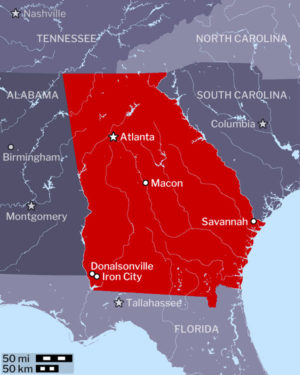 Apr 11: KKK force cancellation of concert by Black pianist. A concert by African-American pianist Graham Jackson scheduled for Thursday night at Donalsonville, Georgia, is cancelled following threats from the Ku Klux Klan. The concert had been booked by the senior class of Seminole County High School as a fundraiser for various class projects. The concert is called off after Klansmen approach school officials, members of the county board of education and local merchants advertising the concert, threatening a boycott if they go through with it. The Klandsmen are said to have come from Iron City, where several crosses have been burned over the past two months. Jackson is a well-regarded pianist and organist, and is regionally famous for playing the massive 4/42 Moller organ in Atlanta’s Fox Theatre. He was also a close friend of Franklin Delano Roosevelt, and had visited with the President on the night before Roosevelt died. The concert was to commemorate the fifth anniversary of his death. The Southern Knights of the Ku Klux Klan in Tallahassee and the Association of Georgia Klans in Atlanta both deny responsibility for the cancellation. But a spokesman for the Georgia Klans says, “little things like that (concert) lead on and on and tend to break down our segregation laws and customs.” A postcard sent to a South Georgia newspaper from “the citizens committee of Seminole County” warns that if gatherings like Jackson’s appearance are allowed, then eventually “Negro children will be going to school with white children.” Everyone connected with the high school refuses to comment. When Jackson learns of the cancellation, he quips, “I’ve been wondering how far Donalsonville is from Unadilla.”
Apr 11: KKK force cancellation of concert by Black pianist. A concert by African-American pianist Graham Jackson scheduled for Thursday night at Donalsonville, Georgia, is cancelled following threats from the Ku Klux Klan. The concert had been booked by the senior class of Seminole County High School as a fundraiser for various class projects. The concert is called off after Klansmen approach school officials, members of the county board of education and local merchants advertising the concert, threatening a boycott if they go through with it. The Klandsmen are said to have come from Iron City, where several crosses have been burned over the past two months. Jackson is a well-regarded pianist and organist, and is regionally famous for playing the massive 4/42 Moller organ in Atlanta’s Fox Theatre. He was also a close friend of Franklin Delano Roosevelt, and had visited with the President on the night before Roosevelt died. The concert was to commemorate the fifth anniversary of his death. The Southern Knights of the Ku Klux Klan in Tallahassee and the Association of Georgia Klans in Atlanta both deny responsibility for the cancellation. But a spokesman for the Georgia Klans says, “little things like that (concert) lead on and on and tend to break down our segregation laws and customs.” A postcard sent to a South Georgia newspaper from “the citizens committee of Seminole County” warns that if gatherings like Jackson’s appearance are allowed, then eventually “Negro children will be going to school with white children.” Everyone connected with the high school refuses to comment. When Jackson learns of the cancellation, he quips, “I’ve been wondering how far Donalsonville is from Unadilla.”▲Wednesday, April 12
▲Thursday, April 13
![]()
 Apr 13: Nash Motors introduces the all-new Rambler. Introduced midway into the 1950 model year, the diminutive Rambler shares the same “Airflyte” body style of its larger corporate siblings, while siting on a 100-inch (254 cm) wheelbase. Although the Rambler was conceived as an inexpensive economy car, Nash-Kelvinator’s President George W. Mason makes the bold decision of introducing it only as a relatively upscale convertible — a more affordable two-door and station wagon will wait until next year. Mason reasons, quite smartly it turns out, that by introducing the Convertible Landau first, and by packing it with more standard features than its competition in either the small car or convertible market, the entire Rambler line will avoid the “cheap little car” reputation when it is rolled out next year. Those standard features include an electric motorized top, whitewall tires, full wheel covers, electric clock, and even a pushbutton AM radio. And its low weight and peppy 6-cylinder engine makes it fun to drive while delivering 30 miles per gallon (7.8 L/100km). Starting at $1,873 (about $20,400 today), the new Rambler isn’t cheap, but it is less expensive and better equipped than its competitors. It delivers better up-front profits for Nash than the stripped down models from Crosley and Kaiser Motors (which will introduce its cheap, compact Henry J in September). Kaiser and Crosley, whose diminutive cars have already suffered a reputation for unreliability, will soon learn that car buyers looking for a bargain will prefer buying a nicer used car or spend a little more money for a Rambler, than purchasing their flimsy, bare-bones offerings.
Apr 13: Nash Motors introduces the all-new Rambler. Introduced midway into the 1950 model year, the diminutive Rambler shares the same “Airflyte” body style of its larger corporate siblings, while siting on a 100-inch (254 cm) wheelbase. Although the Rambler was conceived as an inexpensive economy car, Nash-Kelvinator’s President George W. Mason makes the bold decision of introducing it only as a relatively upscale convertible — a more affordable two-door and station wagon will wait until next year. Mason reasons, quite smartly it turns out, that by introducing the Convertible Landau first, and by packing it with more standard features than its competition in either the small car or convertible market, the entire Rambler line will avoid the “cheap little car” reputation when it is rolled out next year. Those standard features include an electric motorized top, whitewall tires, full wheel covers, electric clock, and even a pushbutton AM radio. And its low weight and peppy 6-cylinder engine makes it fun to drive while delivering 30 miles per gallon (7.8 L/100km). Starting at $1,873 (about $20,400 today), the new Rambler isn’t cheap, but it is less expensive and better equipped than its competitors. It delivers better up-front profits for Nash than the stripped down models from Crosley and Kaiser Motors (which will introduce its cheap, compact Henry J in September). Kaiser and Crosley, whose diminutive cars have already suffered a reputation for unreliability, will soon learn that car buyers looking for a bargain will prefer buying a nicer used car or spend a little more money for a Rambler, than purchasing their flimsy, bare-bones offerings.
▲Friday, April 14
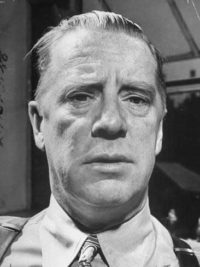 Apr 14: Westbrook Pegler agrees that “homosexualism is worse than Communism.” The suggestion comes from an unnamed “noted American reporter” in Germany, who, according to Pegler, wrote to express his dismay that “91 homosexuals have been dismissed from the State Department in the last three years.” According to this unnamed correspondent, who Pegler approvingly quotes, “Homosexualism is worse than Communism. It changes the mentality, blurs morality and the outlook, not only on sex but upon life, ideals, principles and scruples. It is a cancer.” Pegler apparently agrees; he calls homosexuality an integral part of “New Deal morality.” “In that case, we know what the New Deal morality really is. In that case, we can understand why abnormality flourished in the State Department, to say nothing of other departments, and why those Americans who are aghast at the revelations are in turn reviled as ignorant hypocrites.”
Apr 14: Westbrook Pegler agrees that “homosexualism is worse than Communism.” The suggestion comes from an unnamed “noted American reporter” in Germany, who, according to Pegler, wrote to express his dismay that “91 homosexuals have been dismissed from the State Department in the last three years.” According to this unnamed correspondent, who Pegler approvingly quotes, “Homosexualism is worse than Communism. It changes the mentality, blurs morality and the outlook, not only on sex but upon life, ideals, principles and scruples. It is a cancer.” Pegler apparently agrees; he calls homosexuality an integral part of “New Deal morality.” “In that case, we know what the New Deal morality really is. In that case, we can understand why abnormality flourished in the State Department, to say nothing of other departments, and why those Americans who are aghast at the revelations are in turn reviled as ignorant hypocrites.”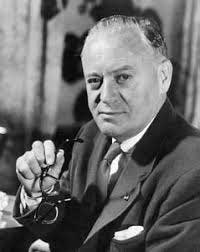 Apr 14: GOP Senator says McCarthy should attack homosexuals instead of Communists. Ultra-conservative and staunch McCarthy defender Sen. Styles Bridges (R-NH) says Sen. Joseph McCarthy (R-WI) is a “real American” in bringing his charges of Communists in the State Department, but says he was “too wild” at the start of his campaign. Speaking before about 200 members of the Executive Club in McCarthy’s home state in Milwaukee, Bridges says McCarthy meant well, but finding Communists is extremely difficult. Bridges says that McCarthy should go after “bad security risks” instead. “When they admit discharging 91 homosexuals, it doesn’t look good,” says Bridges.” A man doesn’t have to be a spy or a Communist to be a bad security risk. He can be a drunkard or a criminal or a homosexual. We can’t have this country loaded with such bad security risks at this time. …We can rid ourselves of bad security risks without a lot of trouble.”
Apr 14: GOP Senator says McCarthy should attack homosexuals instead of Communists. Ultra-conservative and staunch McCarthy defender Sen. Styles Bridges (R-NH) says Sen. Joseph McCarthy (R-WI) is a “real American” in bringing his charges of Communists in the State Department, but says he was “too wild” at the start of his campaign. Speaking before about 200 members of the Executive Club in McCarthy’s home state in Milwaukee, Bridges says McCarthy meant well, but finding Communists is extremely difficult. Bridges says that McCarthy should go after “bad security risks” instead. “When they admit discharging 91 homosexuals, it doesn’t look good,” says Bridges.” A man doesn’t have to be a spy or a Communist to be a bad security risk. He can be a drunkard or a criminal or a homosexual. We can’t have this country loaded with such bad security risks at this time. …We can rid ourselves of bad security risks without a lot of trouble.”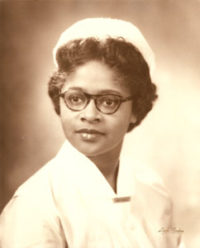 Apr 14: Maryland high court orders University of Maryland to enroll black nursing student. The Maryland Court of Appeals, the state’s highest court, rules that the University of Maryland cannot deny enrollment to Esther McCready to its nursing school at the University’s all-white campus at College Park. In order to maintain segregation at the University of Maryland, the state had entered into a compact with ten other Southern states in which they agreed to accept each others’ Negro students when they seek an education in discplines that aren’t offered at a Negro school in the students’ home state. Since there are no nursing programs available for black students in Maryland, the state had offered to send McCready to Meharry Medical College in Nashville, Tennessee. The Court cites a 1936 case in which an earlier Court of Appeals ruled that in the absence of a Maryland law school for Negroes, qualified Negro law students must be admitted to the university’s law school. (The student in the 1936 case was Donald G. Murray, who is now one of McCready’s lawyers in this case. Another is future Supreme Court Justice Thurgood Marshall.) Desipte that ruling, other programs have remained closed to black students. The university argued, and the lower court agreed, that the 1936 decision applied to the law school only, since law schools teach state law in addition to federal law, while nursing curriculum teaches health care topics that apply regardless of geography. The Maryland Court of Appeals rejects that argument, saying there can be “no distinction between the study of law and the study of nursing.” The University of Maryland will appeal this ruling to the U.S. Supreme Court. But until then McCready will be allowed to enroll at College Park and begin classes in September. In October, the Supreme Court will decline to review the case, leaving the Maryland Court of Appeals decision standing.
Apr 14: Maryland high court orders University of Maryland to enroll black nursing student. The Maryland Court of Appeals, the state’s highest court, rules that the University of Maryland cannot deny enrollment to Esther McCready to its nursing school at the University’s all-white campus at College Park. In order to maintain segregation at the University of Maryland, the state had entered into a compact with ten other Southern states in which they agreed to accept each others’ Negro students when they seek an education in discplines that aren’t offered at a Negro school in the students’ home state. Since there are no nursing programs available for black students in Maryland, the state had offered to send McCready to Meharry Medical College in Nashville, Tennessee. The Court cites a 1936 case in which an earlier Court of Appeals ruled that in the absence of a Maryland law school for Negroes, qualified Negro law students must be admitted to the university’s law school. (The student in the 1936 case was Donald G. Murray, who is now one of McCready’s lawyers in this case. Another is future Supreme Court Justice Thurgood Marshall.) Desipte that ruling, other programs have remained closed to black students. The university argued, and the lower court agreed, that the 1936 decision applied to the law school only, since law schools teach state law in addition to federal law, while nursing curriculum teaches health care topics that apply regardless of geography. The Maryland Court of Appeals rejects that argument, saying there can be “no distinction between the study of law and the study of nursing.” The University of Maryland will appeal this ruling to the U.S. Supreme Court. But until then McCready will be allowed to enroll at College Park and begin classes in September. In October, the Supreme Court will decline to review the case, leaving the Maryland Court of Appeals decision standing.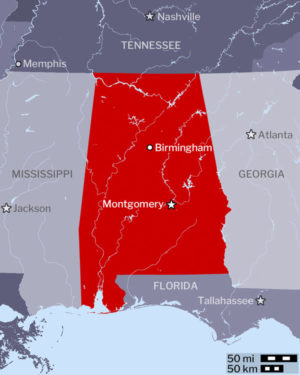 Apr 14: Dental office bombed in Birmingham. A brick residence and dental office under construction in Birmingham, Alabama, is destroyed by a series of bomb blasts. The building is being built for African-American dentist Dr. J.A. Boykin and his school teacher wife at 524 12th Terrace, North. Three separate explosions occur at intervals of less than a minute apart, and are felt a mile away. The blasts occur at 9:00 p.m., shortly after construction workers leave for the day. The building is located in the North Smithfield neighborhood, in an area that was previously all-white but was re-zoned for Negroes last year. That rezoning took place before a Federal District Court judge declared the city’s racial zoning laws unconstitutional. Five other homes were bombed in the area in 1949. No one is arrested for any of the bombings. Dr. Boykin vows to rebuild after receiving a letter from his son, a World War II veteran who fought in the Pacific and who urges his father to “Rebuild… if you have not lost your courage.” The son writes about dodging snipers’ bullets on Saipan “trying to help make things comfortable and safe for the folks back home, and perhaps for those who were implicated in doing us damage, or on the other hand felt themselves too good to live near me.”
Apr 14: Dental office bombed in Birmingham. A brick residence and dental office under construction in Birmingham, Alabama, is destroyed by a series of bomb blasts. The building is being built for African-American dentist Dr. J.A. Boykin and his school teacher wife at 524 12th Terrace, North. Three separate explosions occur at intervals of less than a minute apart, and are felt a mile away. The blasts occur at 9:00 p.m., shortly after construction workers leave for the day. The building is located in the North Smithfield neighborhood, in an area that was previously all-white but was re-zoned for Negroes last year. That rezoning took place before a Federal District Court judge declared the city’s racial zoning laws unconstitutional. Five other homes were bombed in the area in 1949. No one is arrested for any of the bombings. Dr. Boykin vows to rebuild after receiving a letter from his son, a World War II veteran who fought in the Pacific and who urges his father to “Rebuild… if you have not lost your courage.” The son writes about dodging snipers’ bullets on Saipan “trying to help make things comfortable and safe for the folks back home, and perhaps for those who were implicated in doing us damage, or on the other hand felt themselves too good to live near me.”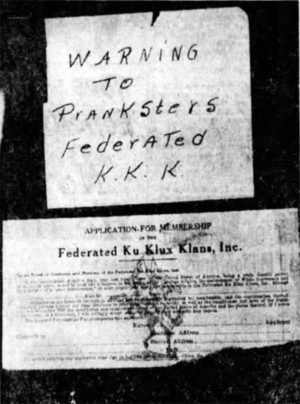 Apr 14: Third cross burned in Nashville Another cross lights up the night sky over Nashville for the second night in a row and the third time since April 5. Last night’s cross was lit on a small hill overlooking McCabe Park in western Nashville. This one is back at Fort Negley Hill, site of the first cross, two miles south of downtown and visible throughout much of Nashville. Until now, police have dismissed the cross-burnings as the work of “pranksters” and claimed that there is no operating Klan organization in the area. But this time, there’s no question as to who is responsible. Left at the scene tonight is a “warning to pranksters” from the “Federated KKK.” Also found at the scene is a blank application form for Klan membership. Inspector Willard Jett states the obvious: “There is a strong indication the Klan was responsible for this one. … Those application blanks can’t be obtained just by anyone.” One witness says she saw a man clothed in a sheet lighting the cross. The next day, William Hugh Morris, head of the Federated Ku Klux Klan in Birmingham, Alabama, will acknowledge to the Nashville Tennessean that there has been an active Klavern in Nashville for the past six months and claim that there are about 10,000 members on several Klaverns throughout Tennessee. But he denies that his Klan is responsible for any Nashville-area cross burnings. “It is regrettable that people would use the Klan’s symbol to create ill feeling between the races,” he says.
Apr 14: Third cross burned in Nashville Another cross lights up the night sky over Nashville for the second night in a row and the third time since April 5. Last night’s cross was lit on a small hill overlooking McCabe Park in western Nashville. This one is back at Fort Negley Hill, site of the first cross, two miles south of downtown and visible throughout much of Nashville. Until now, police have dismissed the cross-burnings as the work of “pranksters” and claimed that there is no operating Klan organization in the area. But this time, there’s no question as to who is responsible. Left at the scene tonight is a “warning to pranksters” from the “Federated KKK.” Also found at the scene is a blank application form for Klan membership. Inspector Willard Jett states the obvious: “There is a strong indication the Klan was responsible for this one. … Those application blanks can’t be obtained just by anyone.” One witness says she saw a man clothed in a sheet lighting the cross. The next day, William Hugh Morris, head of the Federated Ku Klux Klan in Birmingham, Alabama, will acknowledge to the Nashville Tennessean that there has been an active Klavern in Nashville for the past six months and claim that there are about 10,000 members on several Klaverns throughout Tennessee. But he denies that his Klan is responsible for any Nashville-area cross burnings. “It is regrettable that people would use the Klan’s symbol to create ill feeling between the races,” he says.▲Saturday, April 15
![]()
 Apr 15: Belgium’s exiled King offers a temporary solution. Belgian radio broadcasts a recorded message from exiled King Leopold III offering a resolution to the royalty crisis that has split Belgium along sectarian lines for several months. Leopold proposes to transfer “temporarily” his royal powers to his 19-year-old son, Prince Baudouin, making his return from exile as King in name only. The young prince’s exercise of royal powers would later be terminated “at the moment when, with the Government’s agreement, I would consider (it) to be in the interest of the nation.” Instead of presenting a proposal that would address everyone’s concerns, Leopold effectively widens divisions inside the Social Christian (Catholic) party, which represents much of agricultural, Dutch-speaking Flanders where the king’s support is strongest, and inside the Socialist parties, representing the industrial French-speaking Walloon provinces where opposition to the king’s return has led to widespread strikes and demonstrations. The crisis has resulted in the collapse of the Social Christian-led government.
Apr 15: Belgium’s exiled King offers a temporary solution. Belgian radio broadcasts a recorded message from exiled King Leopold III offering a resolution to the royalty crisis that has split Belgium along sectarian lines for several months. Leopold proposes to transfer “temporarily” his royal powers to his 19-year-old son, Prince Baudouin, making his return from exile as King in name only. The young prince’s exercise of royal powers would later be terminated “at the moment when, with the Government’s agreement, I would consider (it) to be in the interest of the nation.” Instead of presenting a proposal that would address everyone’s concerns, Leopold effectively widens divisions inside the Social Christian (Catholic) party, which represents much of agricultural, Dutch-speaking Flanders where the king’s support is strongest, and inside the Socialist parties, representing the industrial French-speaking Walloon provinces where opposition to the king’s return has led to widespread strikes and demonstrations. The crisis has resulted in the collapse of the Social Christian-led government.
▲Sunday, April 16
▲Monday, April 17
▲Tuesday, April 18
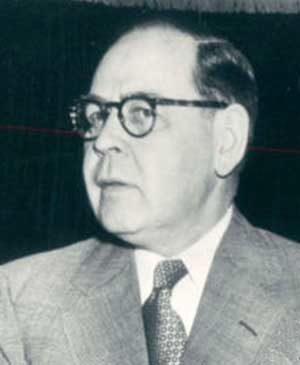 Apr 18: GOP Chairman says “perverts … have infiltrated our government.” Republican National Committee Chairman Guy Gabrielson issues a letter addressed to about 7,000 party workers under the title, “This is the News from Washington.” He writes: “Perhaps as dangerous as the actual Communists are the sexual perverts who have infiltrated our Government in recent years. The State Department has confessed that it has had to fire ninety-one of these. It is the talk of Washington and of the Washington correspondents corps. The country would be more aroused over this tragic angle of the situation if it were not for the difficulties of the newspapers and radio commentators in adequately presenting the facts, while respecting the decency of their American audiences.” The New York Times reports that Gabrielson “elevated what he called the ‘homosexual angle’ to the national political level in his first news letter of 1950.”
Apr 18: GOP Chairman says “perverts … have infiltrated our government.” Republican National Committee Chairman Guy Gabrielson issues a letter addressed to about 7,000 party workers under the title, “This is the News from Washington.” He writes: “Perhaps as dangerous as the actual Communists are the sexual perverts who have infiltrated our Government in recent years. The State Department has confessed that it has had to fire ninety-one of these. It is the talk of Washington and of the Washington correspondents corps. The country would be more aroused over this tragic angle of the situation if it were not for the difficulties of the newspapers and radio commentators in adequately presenting the facts, while respecting the decency of their American audiences.” The New York Times reports that Gabrielson “elevated what he called the ‘homosexual angle’ to the national political level in his first news letter of 1950.”![]()
 Apr 18: Boston Braves signs its first Black player. Sam Jethroe becomes the first African-American player on the Boston Braves roster, and the twelfth African-American in Major League Baseball player since Jackie Robinson integrated the Brooklyn Dodgers in 1947. This makes the Braves the fifth MLB team to integrate, behind the Dodgers, Cleveland Indians, St. Louis Browns, and the New York Giants. Jethroe lists his age at twenty-seven. He is actually thirty-three, which helps to explain his deficiencies in the outfield, where he drops balls and has a weak and inaccurate throw. But it’s his speed, as well as his prowess at bat, that impresses fans. During spring training in 1949, he was clocked in a sixty-yard sprint at 5.9 seconds, which would have beaten the world record at the time by two-tenths of a second. The Braves open their regular season in an away game against the New York Giants at the Polo Grounds in New York. Jethroe at bat goes two for four, including an eighth-inning home run. Jethroe will be named the National League Rookie of the Year for 1950, the oldest ever to be so honored, after hitting a .273 batting average, including eighteen home runs and one hundred runs scored, and leading the league with 35 stolen bases — his speed earns him the nickname “The Jet.” But he will also lead the league’s outfielders in errors. He will be the Braves’ center fielder for three seasons before going back to the minors.
Apr 18: Boston Braves signs its first Black player. Sam Jethroe becomes the first African-American player on the Boston Braves roster, and the twelfth African-American in Major League Baseball player since Jackie Robinson integrated the Brooklyn Dodgers in 1947. This makes the Braves the fifth MLB team to integrate, behind the Dodgers, Cleveland Indians, St. Louis Browns, and the New York Giants. Jethroe lists his age at twenty-seven. He is actually thirty-three, which helps to explain his deficiencies in the outfield, where he drops balls and has a weak and inaccurate throw. But it’s his speed, as well as his prowess at bat, that impresses fans. During spring training in 1949, he was clocked in a sixty-yard sprint at 5.9 seconds, which would have beaten the world record at the time by two-tenths of a second. The Braves open their regular season in an away game against the New York Giants at the Polo Grounds in New York. Jethroe at bat goes two for four, including an eighth-inning home run. Jethroe will be named the National League Rookie of the Year for 1950, the oldest ever to be so honored, after hitting a .273 batting average, including eighteen home runs and one hundred runs scored, and leading the league with 35 stolen bases — his speed earns him the nickname “The Jet.” But he will also lead the league’s outfielders in errors. He will be the Braves’ center fielder for three seasons before going back to the minors.
![]()
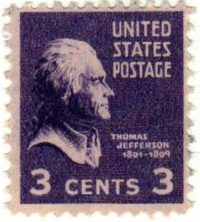 Apr 18: Post Office to cut mail delivers to only once per day. Postmaster General Jesse M. Donaldson orders several cost-cutting moves after a House committee made drastic cuts to the Post Office budget. The most serious cost-cutting measure is the immediate reduction of residential mail deliveries to only once per day instead of the two deliveries currently being made on most major city delivery routes.
Apr 18: Post Office to cut mail delivers to only once per day. Postmaster General Jesse M. Donaldson orders several cost-cutting moves after a House committee made drastic cuts to the Post Office budget. The most serious cost-cutting measure is the immediate reduction of residential mail deliveries to only once per day instead of the two deliveries currently being made on most major city delivery routes.
▲Wednesday, April 19
▲Thursday, April 20
![]()
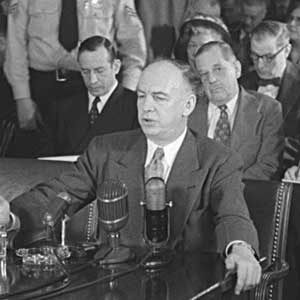 Apr 20: Former Communist claims Lattimore was a secret party member. Louis F. Budenz, the former editor of the Communist newspaper The Daily Worker who recanted his politics and returned to Roman Catholicism in 1945, testifies before the Tydings Senate subcommittee investigating Sen. Joseph McCarthy’s (R-WI) charges of Communists in the State Department. McCarthy had brought in Budenz to counter the April 6 testimony by Prof. Owen Lattimore, a Johns Hopkins professor, Far East expert and occasional adviser for the State Department, that he is not and never had been a Communist, a Communist sympathizer or agent. Budenz claims that he was “officially informed” by Earl Browder, the Communist Party’s General Secretary until 1946, that Prof. Owen Lattimore was a secret Party member, serving under Party orders to undermine the Chinese Nationalist government. Bundenz concedes however that he has never seen Lattimore at a Communist party meeting, that he hasn’t ever met Lattimore, and that he doesn’t have any independent personal knowledge about Lattimore being a Communist. Budenz further acknowledges that in all of the interviews he had given the FBI, and in all the testimonies he has given Congress since renouncing Communism, he had never mentioned Lattimore’s alleged membership. Also testifying before the subcommittee is retired Gen. Elliot Thorpe, Gen. Douglas MacArthur’s wartime counter-intelligence officer. Thorpe testifies that Lattimore had undergone three military investigations concerning his loyalty, and that the results were so conclusive that Lattimore was granted access to secret documents. Thorpe adds: “Were I called upon to commit my personal safety and that of my command on information supplied by Dr. Lattimore, I would do so with confidence that he would always act as a loyal American.”
Apr 20: Former Communist claims Lattimore was a secret party member. Louis F. Budenz, the former editor of the Communist newspaper The Daily Worker who recanted his politics and returned to Roman Catholicism in 1945, testifies before the Tydings Senate subcommittee investigating Sen. Joseph McCarthy’s (R-WI) charges of Communists in the State Department. McCarthy had brought in Budenz to counter the April 6 testimony by Prof. Owen Lattimore, a Johns Hopkins professor, Far East expert and occasional adviser for the State Department, that he is not and never had been a Communist, a Communist sympathizer or agent. Budenz claims that he was “officially informed” by Earl Browder, the Communist Party’s General Secretary until 1946, that Prof. Owen Lattimore was a secret Party member, serving under Party orders to undermine the Chinese Nationalist government. Bundenz concedes however that he has never seen Lattimore at a Communist party meeting, that he hasn’t ever met Lattimore, and that he doesn’t have any independent personal knowledge about Lattimore being a Communist. Budenz further acknowledges that in all of the interviews he had given the FBI, and in all the testimonies he has given Congress since renouncing Communism, he had never mentioned Lattimore’s alleged membership. Also testifying before the subcommittee is retired Gen. Elliot Thorpe, Gen. Douglas MacArthur’s wartime counter-intelligence officer. Thorpe testifies that Lattimore had undergone three military investigations concerning his loyalty, and that the results were so conclusive that Lattimore was granted access to secret documents. Thorpe adds: “Were I called upon to commit my personal safety and that of my command on information supplied by Dr. Lattimore, I would do so with confidence that he would always act as a loyal American.”
▲Friday, April 21
![]() Apr 21: Lattimore slams “gossip and hearsay.” Prof. Owel Lattimore derides as “gossip and hearsay” Louis Budenz’s testimony yesterday accusing Lattimore of being a secret member of the Communist Party. Speaking at a press conference at his attorneys’ office, Lattimore demands an investigation of an alleged pro-Nationalist China lobby which he says is running “a campaign of character assassination” against all who disagree with it. But among other Senators, Budenz’s testimony is having its effect. Progressive Sen. Ralph Flanders (R-VT) says that McCarthy’s accusations have “taken a more serious turn” with Budenz’s testimony, noting that the public is “properly disturbed.”
Apr 21: Lattimore slams “gossip and hearsay.” Prof. Owel Lattimore derides as “gossip and hearsay” Louis Budenz’s testimony yesterday accusing Lattimore of being a secret member of the Communist Party. Speaking at a press conference at his attorneys’ office, Lattimore demands an investigation of an alleged pro-Nationalist China lobby which he says is running “a campaign of character assassination” against all who disagree with it. But among other Senators, Budenz’s testimony is having its effect. Progressive Sen. Ralph Flanders (R-VT) says that McCarthy’s accusations have “taken a more serious turn” with Budenz’s testimony, noting that the public is “properly disturbed.”
![]()
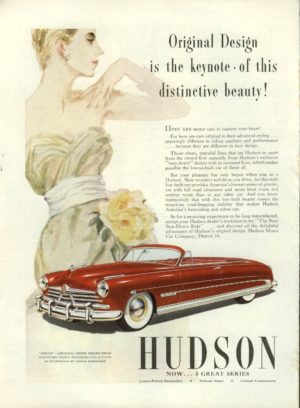 Apr 21: Hudson reveals new convertible. Hudson dealerships across the country unveil a new convertible model in the Hudson Commodore line. The Commodore line was first introduced in December of 1947 as one of the first new post-war designs. It was so far ahead of its time that the company hasn’t done much to change it since then. The Commodore convertible features the same “step down” design as the rest of the Commodore lineup. The “step down” design entails a semi-unibody that sits inside a frame instead of a traditional body sitting on top of it. Consequently, instead of “climbing up” to get into the car, passengers “step down.” This gives passengers the safety of being surrounded by the chassis instead of riding above it. It also gives the the car a lower, sleeker look and a lower center of gravity, which greatly improves its handling and offers its passengers a much steadier ride. These cars are very expensive though. A 123 horsepower six cylinder model goes for $2,891 (about $31,400 today), and the 128 horsepower eight-cylinder model sells for $2,975 ($32,300 today). But with that, you get an electric top and windows, a map light in the windshield header, and a control for raising and lowering the radio antenna. Additional luxurious touches include hand-buffed red or blue leather upholstery, roll-away ashtrays for rear passengers and a folding rear seat center arm rest.
Apr 21: Hudson reveals new convertible. Hudson dealerships across the country unveil a new convertible model in the Hudson Commodore line. The Commodore line was first introduced in December of 1947 as one of the first new post-war designs. It was so far ahead of its time that the company hasn’t done much to change it since then. The Commodore convertible features the same “step down” design as the rest of the Commodore lineup. The “step down” design entails a semi-unibody that sits inside a frame instead of a traditional body sitting on top of it. Consequently, instead of “climbing up” to get into the car, passengers “step down.” This gives passengers the safety of being surrounded by the chassis instead of riding above it. It also gives the the car a lower, sleeker look and a lower center of gravity, which greatly improves its handling and offers its passengers a much steadier ride. These cars are very expensive though. A 123 horsepower six cylinder model goes for $2,891 (about $31,400 today), and the 128 horsepower eight-cylinder model sells for $2,975 ($32,300 today). But with that, you get an electric top and windows, a map light in the windshield header, and a control for raising and lowering the radio antenna. Additional luxurious touches include hand-buffed red or blue leather upholstery, roll-away ashtrays for rear passengers and a folding rear seat center arm rest.
▲Saturday, April 22
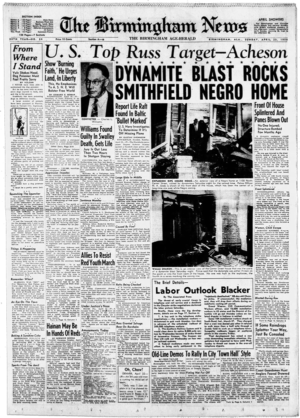 Apr 22: Another home bombed in Birmingham. Another bomb rips through an African-American-owned home in the North Smithfield neighborhood of Birmingham, Alabama. Dorothy Kindred, who lives upstairs, is with her two-year-old child when the blast goes off, but neither are hurt. W.B Henderson, who owns the home at 1100 N. Center Street, is not at home at the time. The house had been zoned for white residents, but a Federal District Court judge declared the city’s racial zoning laws unconstitutional and issued an injunction preventing the city from enforcing them. The city is currently appealing the judge’s decision to the U.S. Supreme Court. Several months ago, Henderson found several sticks of dynamite in the yard. An investigation at that time showed that the fuse had been lit but had gone out. Last October, Henderson rented the house to an African-American minister, Rev. Milton Curry, when it was bombed along with the house next door. Curry moved out a short time later. This is the second bombing in the neighborhood this month and the seventh in the past thirteen months. No one will be arrested for this bombing.
Apr 22: Another home bombed in Birmingham. Another bomb rips through an African-American-owned home in the North Smithfield neighborhood of Birmingham, Alabama. Dorothy Kindred, who lives upstairs, is with her two-year-old child when the blast goes off, but neither are hurt. W.B Henderson, who owns the home at 1100 N. Center Street, is not at home at the time. The house had been zoned for white residents, but a Federal District Court judge declared the city’s racial zoning laws unconstitutional and issued an injunction preventing the city from enforcing them. The city is currently appealing the judge’s decision to the U.S. Supreme Court. Several months ago, Henderson found several sticks of dynamite in the yard. An investigation at that time showed that the fuse had been lit but had gone out. Last October, Henderson rented the house to an African-American minister, Rev. Milton Curry, when it was bombed along with the house next door. Curry moved out a short time later. This is the second bombing in the neighborhood this month and the seventh in the past thirteen months. No one will be arrested for this bombing.▲Sunday, April 23
St. George’s Day (England)
![]()
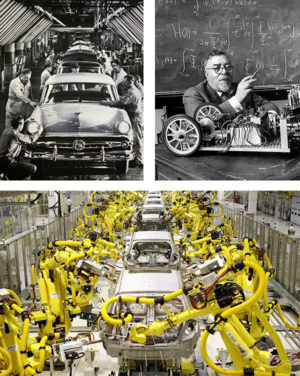 Apr 23: MIT professor says robots will replace people in factories. Dr. Norbert Wiener, an eminent mathematician at the Massachusetts Institute of Technology whose work plays an important role in control systems, robotics and cybernetics, says in an interview published in the Boston Globe that the U.S. is “on the threshold of a catastrophic second industrial revolution brought about the by use of the automated machine. Unless we prepare ourselves for it our industrial cities face a vast decentralization process, and a shifting of population to rural districts brought about by unemployment.” Wiener points to the shutdown of the huge mills in Manchester, New Hampshire, as an example of how automated machines are already displacing human labor. He predicts that “the rapid development of the automatic machine in industry will … completely wipe out the assembly line and in its place substitute a complicated electronic machine which will do the same work faster and better. Whereas an assembly line contained a hundred workers, with the automation, this same line will resemble the emptiness of a huge power plant, with only a skeleton maintenance crew to service the machine.” He says, “We must prepare for this by intelligent use of welfare until a time of stabilization occurs. We must change our judgement of value from a quantitative to a qualitative one. We can no longer fear the word ‘socialism’.” Wiener predicts that this revolution would take place “within the next decade, or sooner if hastened by another war,” which won’t quite come true. It will take about twenty-five to fifty years, depending on the industry. Entertainer and columnist Billy Rose envisions a time capsule to be buried in 1950 and opened in 2050. He suggests placing a copy of Time magazine with an article mentioning Wiener’s work. Says Rose, “It will probably startle the cellar-dwellers of 2050 to learn that there was a time when people were only thinking of the machines taking over.”
Apr 23: MIT professor says robots will replace people in factories. Dr. Norbert Wiener, an eminent mathematician at the Massachusetts Institute of Technology whose work plays an important role in control systems, robotics and cybernetics, says in an interview published in the Boston Globe that the U.S. is “on the threshold of a catastrophic second industrial revolution brought about the by use of the automated machine. Unless we prepare ourselves for it our industrial cities face a vast decentralization process, and a shifting of population to rural districts brought about by unemployment.” Wiener points to the shutdown of the huge mills in Manchester, New Hampshire, as an example of how automated machines are already displacing human labor. He predicts that “the rapid development of the automatic machine in industry will … completely wipe out the assembly line and in its place substitute a complicated electronic machine which will do the same work faster and better. Whereas an assembly line contained a hundred workers, with the automation, this same line will resemble the emptiness of a huge power plant, with only a skeleton maintenance crew to service the machine.” He says, “We must prepare for this by intelligent use of welfare until a time of stabilization occurs. We must change our judgement of value from a quantitative to a qualitative one. We can no longer fear the word ‘socialism’.” Wiener predicts that this revolution would take place “within the next decade, or sooner if hastened by another war,” which won’t quite come true. It will take about twenty-five to fifty years, depending on the industry. Entertainer and columnist Billy Rose envisions a time capsule to be buried in 1950 and opened in 2050. He suggests placing a copy of Time magazine with an article mentioning Wiener’s work. Says Rose, “It will probably startle the cellar-dwellers of 2050 to learn that there was a time when people were only thinking of the machines taking over.”
▲Monday, April 24
![]() Apr 24: Truman denounces McCarthy: We’re going to keep the Bill of Rights on our books.” President Harry Truman gives a much-anticipated speech at a Federal Bar Association dinner in which he denounces the tactics of Sen. Joseph McCarthy (R-WI), whose charges of Communist infiltration of the State Department have roiled the Senate and brought about a Senate subcommittee inquiry. He delivers a vigorous defense of his administration’s loyalty program, which he says has done an effective job of keeping Communists off of the federal payroll. “We now have under investigation the cases of over 1,000 citizens to determine whether steps should be taken to revoke their citizenship on grounds involving subversive activities. One hundred and thirty-eight persons are under orders of deportation on grounds involving Communism.” Without mentioning McCarthy by name, Truman denounces “false patriots” who say that this program doesn’t go far enough. “They want us to dismiss employees on the basis of unsupported charges,” he says. But “under the supervision of this (Loyalty Review Board), the loyalty program has rid the government of all employees who were found to be disloyal … Not a single person who has been adjudged to be a Communist or otherwise disloyal remains on the Government payroll today.” Contrasting his administration’s methods to McCarthy’s anti-communist campaign in the Senate, Truman says that the Loyalty Review Board’s investigators “know the job cannot be done by publicly denouncing men as ‘Communists’ without having evidence to support such a charge or by blackening the character of persons because their views are different from those of the accuser, or by hurling sensational accusations based on gossip, hearsay, or maybe just a hunch. … There is a right way and a wrong way to fight Communism. … We are not going to transform our fine FBI into a gestapo secret police. That’s what some people would like to do. We are not going to try to control what our people read and say and think. We are not going to turn the United States into a right-wing totalitarian country in order to deal with a left-wing totalitarian threat. In short, we’re not going to end democracy. We’re going to keep the Bill of Rights on the books.”
Apr 24: Truman denounces McCarthy: We’re going to keep the Bill of Rights on our books.” President Harry Truman gives a much-anticipated speech at a Federal Bar Association dinner in which he denounces the tactics of Sen. Joseph McCarthy (R-WI), whose charges of Communist infiltration of the State Department have roiled the Senate and brought about a Senate subcommittee inquiry. He delivers a vigorous defense of his administration’s loyalty program, which he says has done an effective job of keeping Communists off of the federal payroll. “We now have under investigation the cases of over 1,000 citizens to determine whether steps should be taken to revoke their citizenship on grounds involving subversive activities. One hundred and thirty-eight persons are under orders of deportation on grounds involving Communism.” Without mentioning McCarthy by name, Truman denounces “false patriots” who say that this program doesn’t go far enough. “They want us to dismiss employees on the basis of unsupported charges,” he says. But “under the supervision of this (Loyalty Review Board), the loyalty program has rid the government of all employees who were found to be disloyal … Not a single person who has been adjudged to be a Communist or otherwise disloyal remains on the Government payroll today.” Contrasting his administration’s methods to McCarthy’s anti-communist campaign in the Senate, Truman says that the Loyalty Review Board’s investigators “know the job cannot be done by publicly denouncing men as ‘Communists’ without having evidence to support such a charge or by blackening the character of persons because their views are different from those of the accuser, or by hurling sensational accusations based on gossip, hearsay, or maybe just a hunch. … There is a right way and a wrong way to fight Communism. … We are not going to transform our fine FBI into a gestapo secret police. That’s what some people would like to do. We are not going to try to control what our people read and say and think. We are not going to turn the United States into a right-wing totalitarian country in order to deal with a left-wing totalitarian threat. In short, we’re not going to end democracy. We’re going to keep the Bill of Rights on the books.”
▲Tuesday, April 25
ANZAC Day (Australia, New Zealand)
![]()
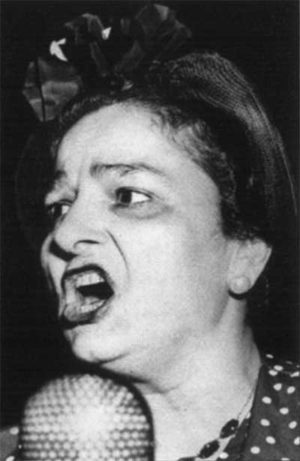 Apr 25: Former Communist denounces McCarthy witnesss. A bellicose Dr. Bella V. Dodd, a former Communist, loudly denounces fellow ex-Communist Louis F. Budenz as “the finger man” for those who are seeking to destroy the reputation of anyone who didn’t want a “Holy War” against Russia. Testifying before a Senate Foreign Relations subcommittee investigating McCarthy’s charges of Communists in the State Department, Dodd angrily denounces Budenz’s testimony in which he says that Owen Lattimore, Johns Hopkins professor and sometime State Department adviser on the Far East, was a secret member of the Communist party, serving under orders to undermine the Chinese Nationalist government. Dodd, points out that she held a higher position than Budenz in the Communist Party and says, “In all my associations with the Communist Party, I never heard his name mentioned … either as a party member or as a fellow traveler, or even as a friend.”
Apr 25: Former Communist denounces McCarthy witnesss. A bellicose Dr. Bella V. Dodd, a former Communist, loudly denounces fellow ex-Communist Louis F. Budenz as “the finger man” for those who are seeking to destroy the reputation of anyone who didn’t want a “Holy War” against Russia. Testifying before a Senate Foreign Relations subcommittee investigating McCarthy’s charges of Communists in the State Department, Dodd angrily denounces Budenz’s testimony in which he says that Owen Lattimore, Johns Hopkins professor and sometime State Department adviser on the Far East, was a secret member of the Communist party, serving under orders to undermine the Chinese Nationalist government. Dodd, points out that she held a higher position than Budenz in the Communist Party and says, “In all my associations with the Communist Party, I never heard his name mentioned … either as a party member or as a fellow traveler, or even as a friend.”
▲Wednesday, April 26
![]()
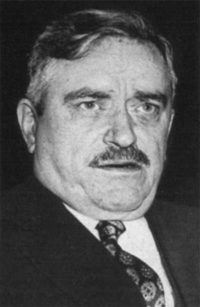 Apr 26: Former Communist Party head disputes McCarthy’s charge against Lattimore. Earl Browder, the deposed head of the Communist Party in the United States, testifies before a Senate Foreign Relations subcommittee investigating McCarthy’s charges of Communists in the State Department. McCarthy had accused Far East policy expert Prof. Owen Lattimore, of Johns Hopkins University, of being a “top Russian espionage agent” working “to destroy the nation by force of violence.” A week earlier, Louis Budenz, a former editor of the Communist Daily Worker, testified that Browder had “officially informed” him that Lattimore was a “secret member” of the Communist party. Browder calls Budenz’s testimony “ridiculous and false,” and that it was “hard to imagine how even a professional perjurer” could give the kind of testimony Budenz gave. Says Browder, “Anyone of the prominence of Mr. Lattimore I certainly should have known if he was in the party. Mr. Lattimore was definitely known to me as a person of anti-Communist views of a decided and profound character.”
Apr 26: Former Communist Party head disputes McCarthy’s charge against Lattimore. Earl Browder, the deposed head of the Communist Party in the United States, testifies before a Senate Foreign Relations subcommittee investigating McCarthy’s charges of Communists in the State Department. McCarthy had accused Far East policy expert Prof. Owen Lattimore, of Johns Hopkins University, of being a “top Russian espionage agent” working “to destroy the nation by force of violence.” A week earlier, Louis Budenz, a former editor of the Communist Daily Worker, testified that Browder had “officially informed” him that Lattimore was a “secret member” of the Communist party. Browder calls Budenz’s testimony “ridiculous and false,” and that it was “hard to imagine how even a professional perjurer” could give the kind of testimony Budenz gave. Says Browder, “Anyone of the prominence of Mr. Lattimore I certainly should have known if he was in the party. Mr. Lattimore was definitely known to me as a person of anti-Communist views of a decided and profound character.”
![]() Apr 26: Belgian Socialists reject exiled King’s return. After almost two weeks of haggling, Belgian Socialists reject King Leopold’s April 15 proposal for his return from exile. They say that the King’s offer to allow his son, Crown Prince Baudouin, to act as his Regent is “dangerously vague and incomplete.” The Socialists say that it would be essential for the King to remain out of the country “during a preliminary period at least,” to guard against Leopold having too much day-to-day influence on his nineteen-year-old son. The Socialists promise to resume “full liberty of action,” which for now means more general strikes and demonstrations.
Apr 26: Belgian Socialists reject exiled King’s return. After almost two weeks of haggling, Belgian Socialists reject King Leopold’s April 15 proposal for his return from exile. They say that the King’s offer to allow his son, Crown Prince Baudouin, to act as his Regent is “dangerously vague and incomplete.” The Socialists say that it would be essential for the King to remain out of the country “during a preliminary period at least,” to guard against Leopold having too much day-to-day influence on his nineteen-year-old son. The Socialists promise to resume “full liberty of action,” which for now means more general strikes and demonstrations.
▲Thursday, April 27
![]()
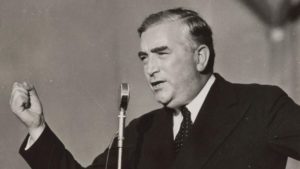 Apr 27: Australia proposes to ban Communist Party. Australia’s Prime Minister Robert Menzies introduces a bill into the House of Representatives to ban the Communist Party. The Communist Party Dissolution Bill would declare the Australian Communist Party illegal, confiscate its property without compensation, and empower the Governor-General to declare any organization that it deems to be a Communist front unlawful and confiscate their property as well. Any officers of those organizations who continue their activities or try to enlist others to their causes, would be imprisoned for up to five years. And anyone who is declared to be a Communist or “likely to engage” in activities “prejudicial” to the government would be prohibited from holding public or trade union office, and would be barred from government employment. Such a person would also be banned from holding positions of responsibility in “key” positions, including coal, iron, building, steel, transportation, power, engineering or other industries deemed vital to Australia’s defense and security. The law will be enacted in October and immediately challenged in the High Court.
Apr 27: Australia proposes to ban Communist Party. Australia’s Prime Minister Robert Menzies introduces a bill into the House of Representatives to ban the Communist Party. The Communist Party Dissolution Bill would declare the Australian Communist Party illegal, confiscate its property without compensation, and empower the Governor-General to declare any organization that it deems to be a Communist front unlawful and confiscate their property as well. Any officers of those organizations who continue their activities or try to enlist others to their causes, would be imprisoned for up to five years. And anyone who is declared to be a Communist or “likely to engage” in activities “prejudicial” to the government would be prohibited from holding public or trade union office, and would be barred from government employment. Such a person would also be banned from holding positions of responsibility in “key” positions, including coal, iron, building, steel, transportation, power, engineering or other industries deemed vital to Australia’s defense and security. The law will be enacted in October and immediately challenged in the High Court.
▲Friday, April 28
![]()
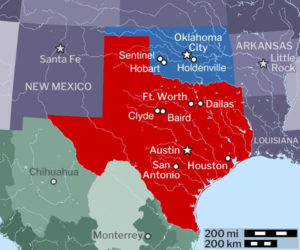 Apr 28: Deadly tornadoes rip Texas and Oklahoma. Tornadoes roar across Oklahoma and West Texas, killing five in Holdenville, Oklahoma. Three members of one family are killed in Clyde, Texas, and two more near Baird. A Hobart, Oklahoma man is killed, as is a man in Sentinel, Oklahoma, who has apparently died of a heart attack after phoning a warning to his wife.
Apr 28: Deadly tornadoes rip Texas and Oklahoma. Tornadoes roar across Oklahoma and West Texas, killing five in Holdenville, Oklahoma. Three members of one family are killed in Clyde, Texas, and two more near Baird. A Hobart, Oklahoma man is killed, as is a man in Sentinel, Oklahoma, who has apparently died of a heart attack after phoning a warning to his wife.
▲Saturday, April 29
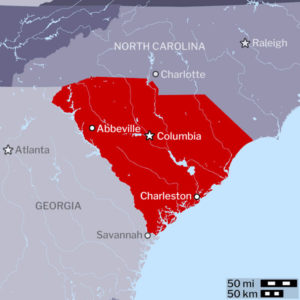 Apr 29: KKK parades through Abbeville, SC. Thirty-four cars of robed and masked men parade through Abbeville, South Carolina. The motorcade forms at Abbevile (Negro) Training School at 8:15 p.m. and parades through town for the better part of an hour. The parade is led by a black 1949 Ford with an electric cross and American flag on the front bumper. Some paraders wear masks, some hoods, some dark glasses. Two carloads of women are also spotted. A huge crowd gathers to witness the start of the parade, and so many try to join it that they almost cause an accident. The route passes through the town square to Harrisburg, the African-American neighborhood, before passing the Kum-Bak Drive-In Restaurant, circling the old train depot, and then heading southwest out of town.
Apr 29: KKK parades through Abbeville, SC. Thirty-four cars of robed and masked men parade through Abbeville, South Carolina. The motorcade forms at Abbevile (Negro) Training School at 8:15 p.m. and parades through town for the better part of an hour. The parade is led by a black 1949 Ford with an electric cross and American flag on the front bumper. Some paraders wear masks, some hoods, some dark glasses. Two carloads of women are also spotted. A huge crowd gathers to witness the start of the parade, and so many try to join it that they almost cause an accident. The route passes through the town square to Harrisburg, the African-American neighborhood, before passing the Kum-Bak Drive-In Restaurant, circling the old train depot, and then heading southwest out of town.![]() Apr 29: Belgium Parliament dissolved, new elections ordered. Belgium’s Regent Prince Charles dissolves Parliament and orders new elections after a final effort to form a coalition government of Social Christians (Catholic) and Liberals fails. The elections, which are set for June 4, will be the third time Belgians have gone to the polls where the question of exiled King Leopold III’s return is front and center. Belgium has been without a working government since March 18, when the government of Gaston Eyskens collapsed a week after a divisive referendum failed to settle the question about whether the controversial King should be allowed to return from exile in Switzerland.
Apr 29: Belgium Parliament dissolved, new elections ordered. Belgium’s Regent Prince Charles dissolves Parliament and orders new elections after a final effort to form a coalition government of Social Christians (Catholic) and Liberals fails. The elections, which are set for June 4, will be the third time Belgians have gone to the polls where the question of exiled King Leopold III’s return is front and center. Belgium has been without a working government since March 18, when the government of Gaston Eyskens collapsed a week after a divisive referendum failed to settle the question about whether the controversial King should be allowed to return from exile in Switzerland.
![[Emphasis Mine]](http://jimburroway.com/wp-content/uploads/2018/01/JuliusSipIn.jpg)
